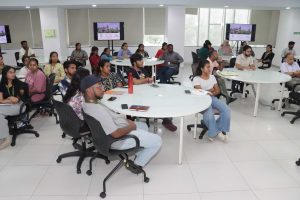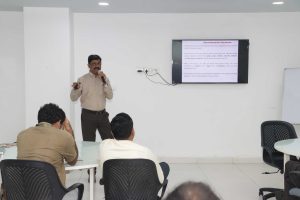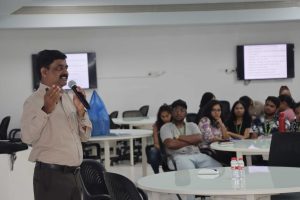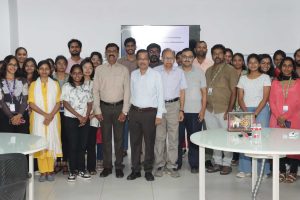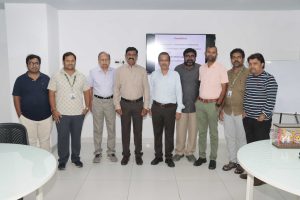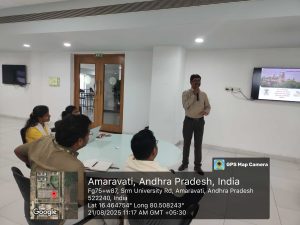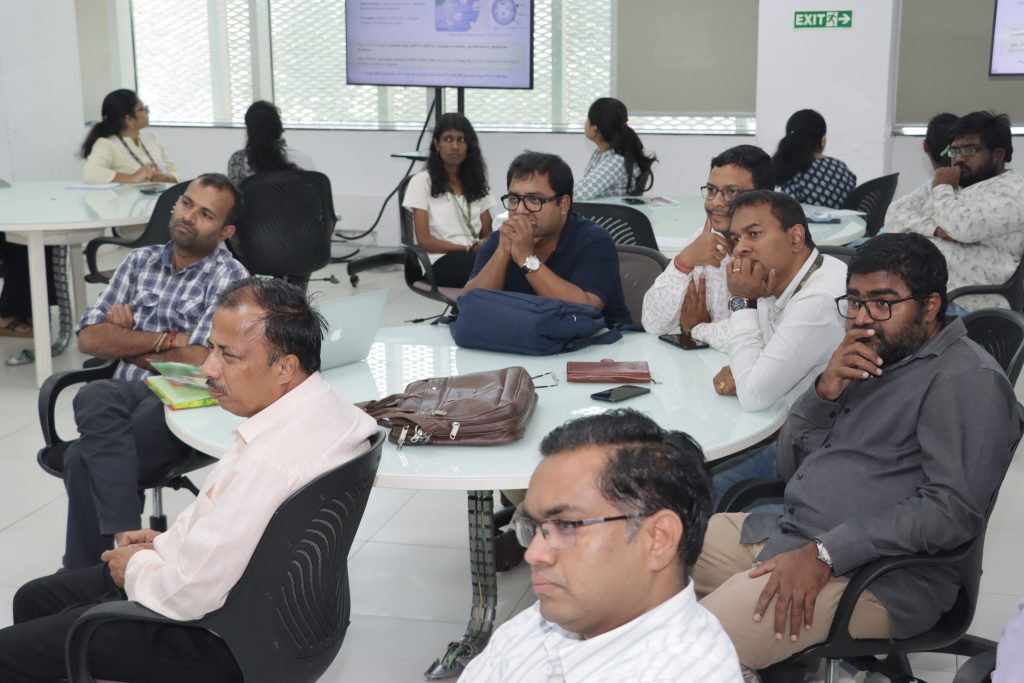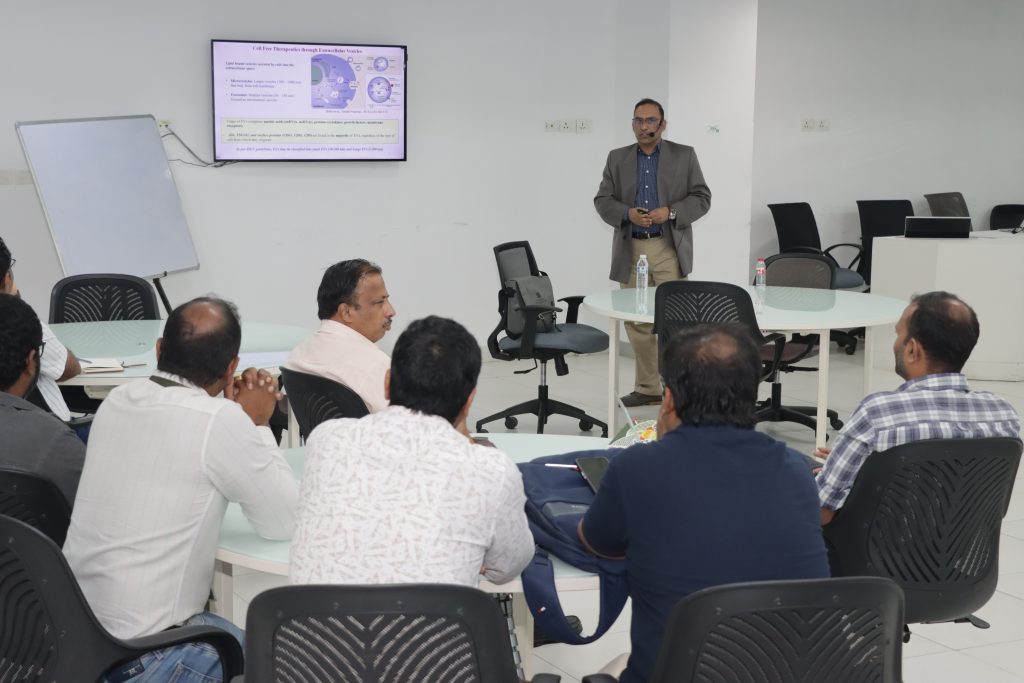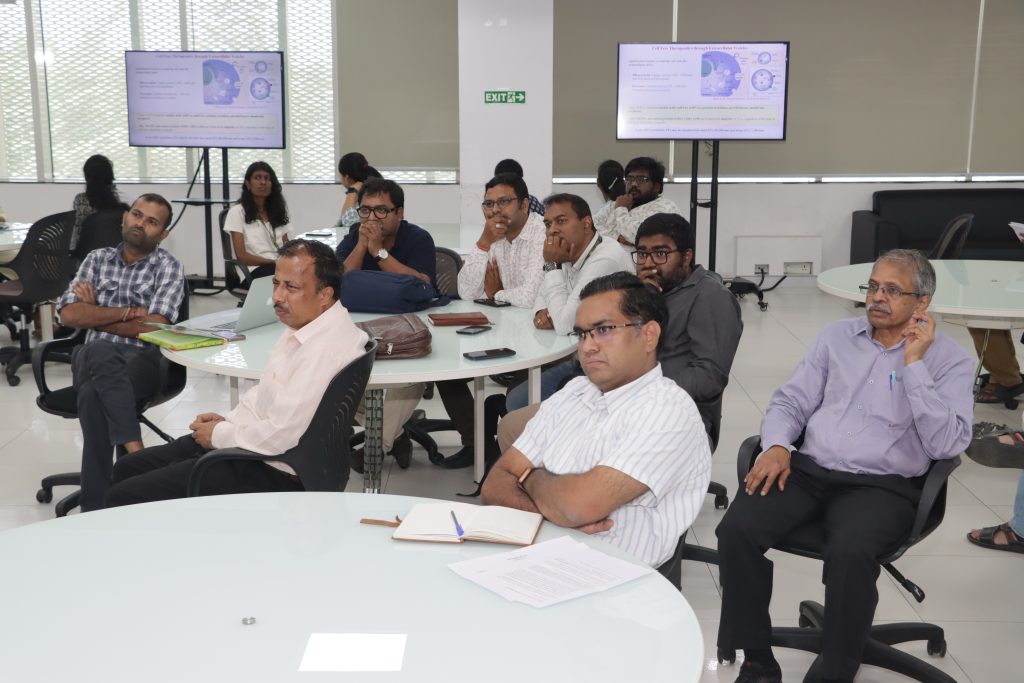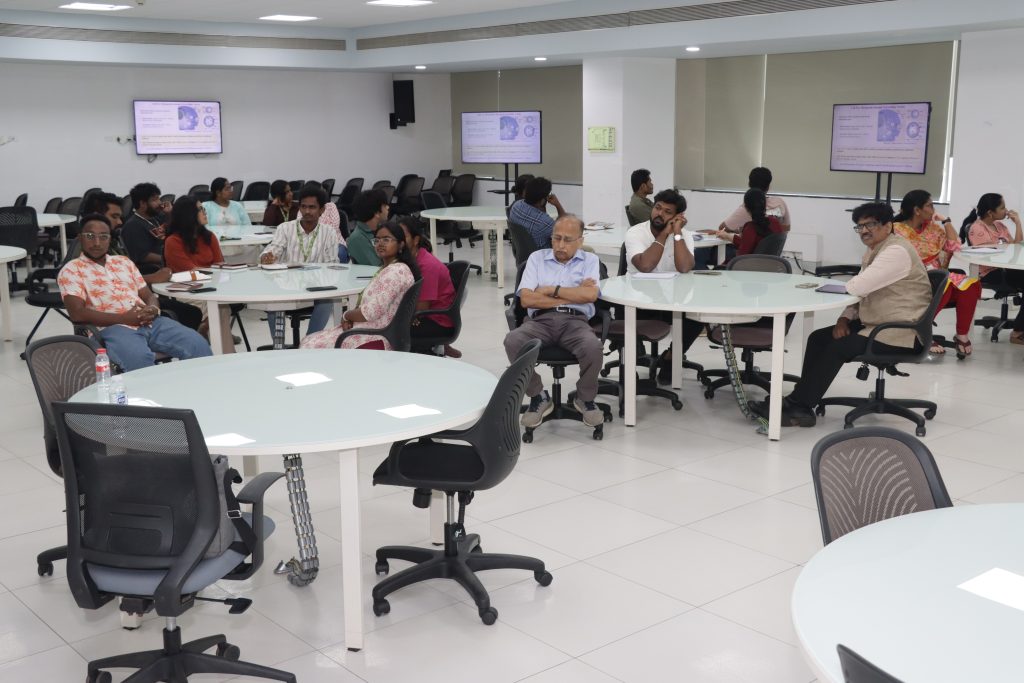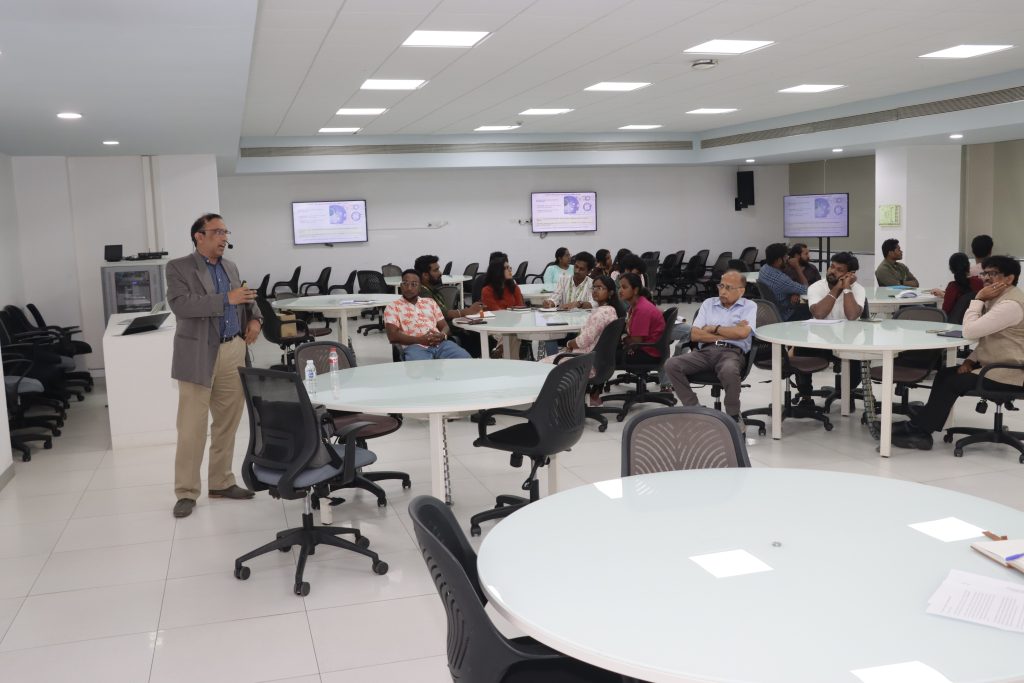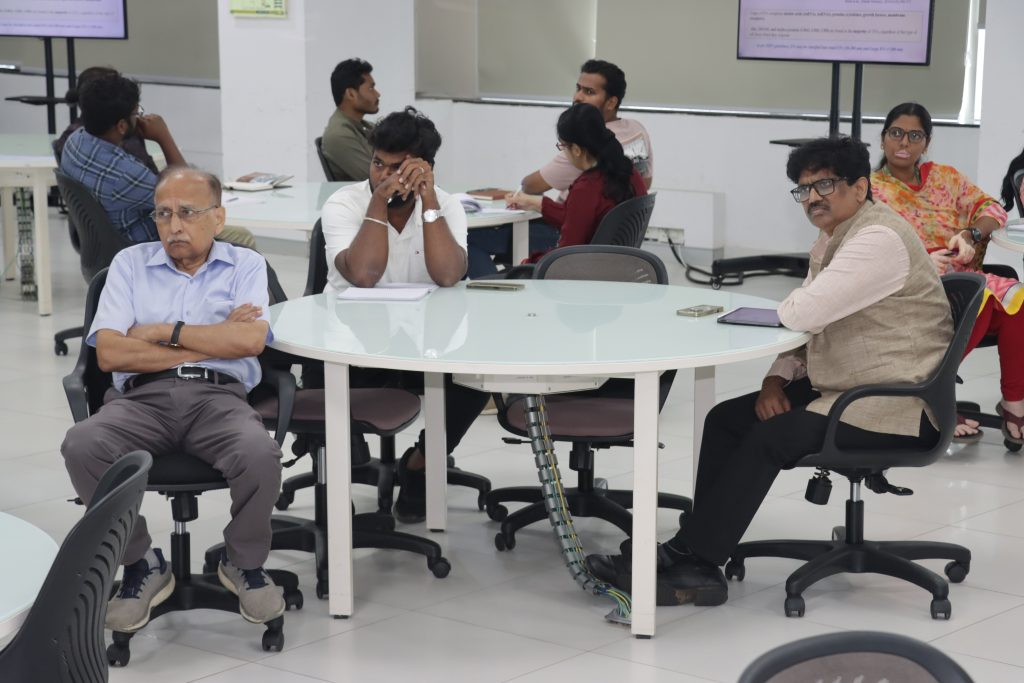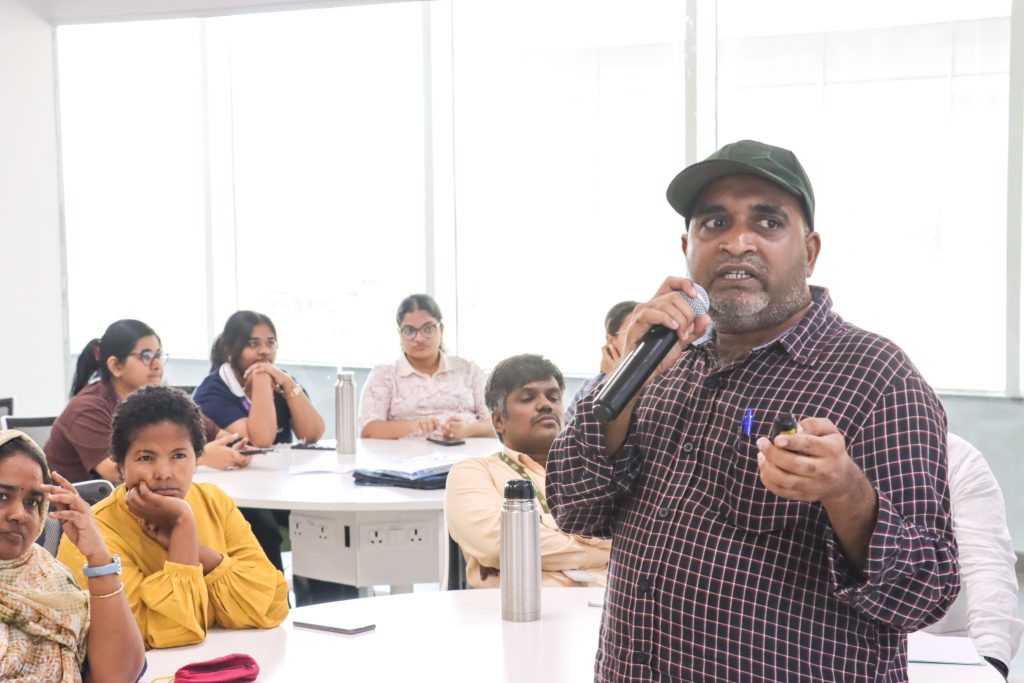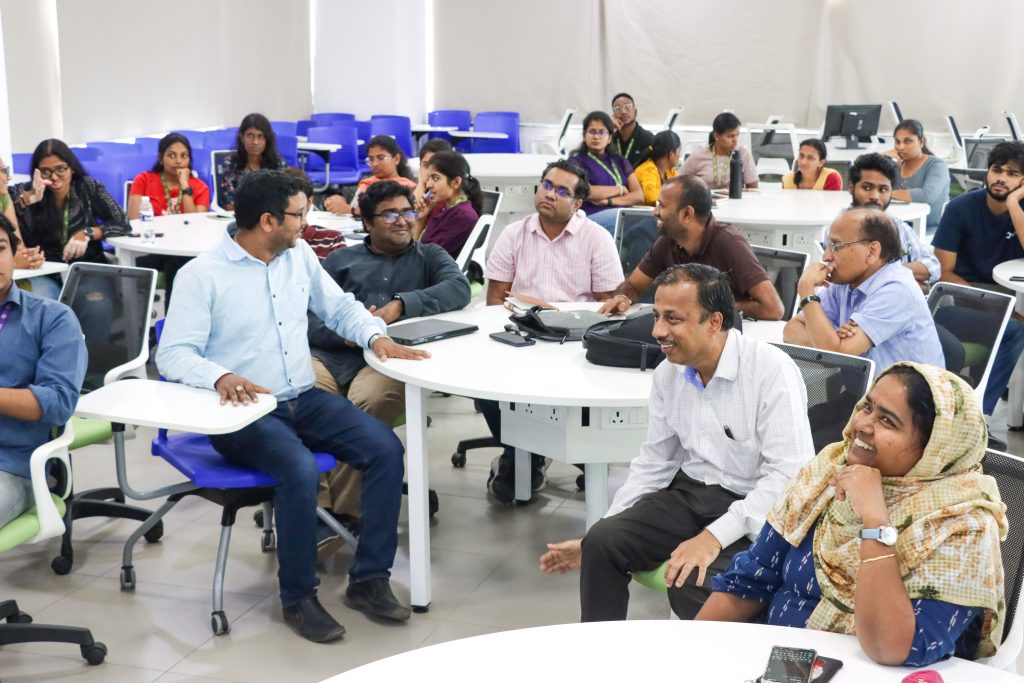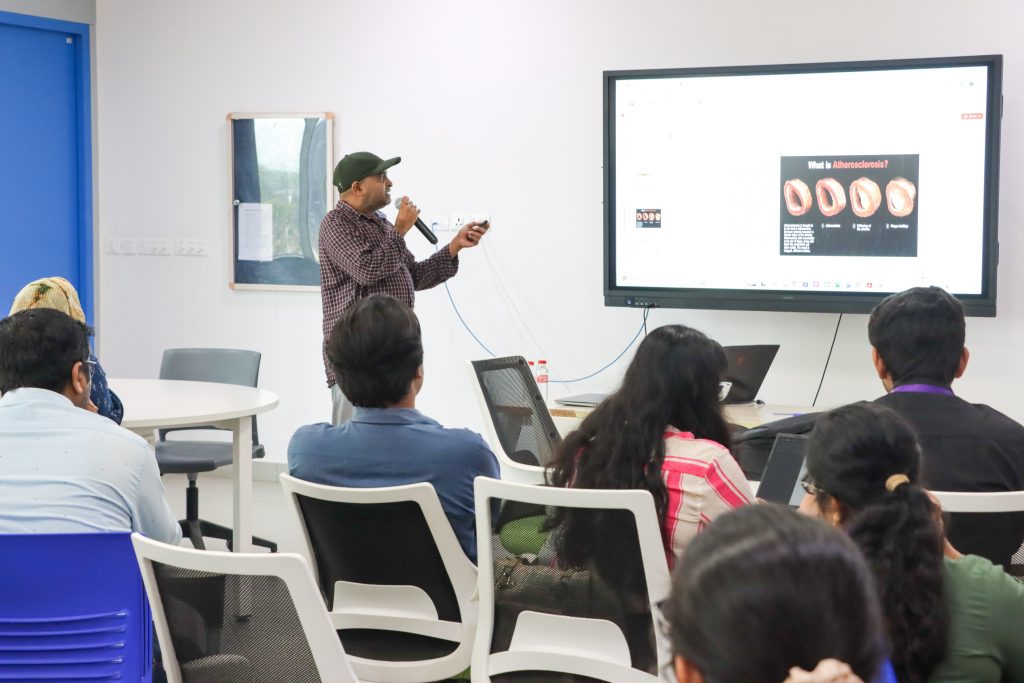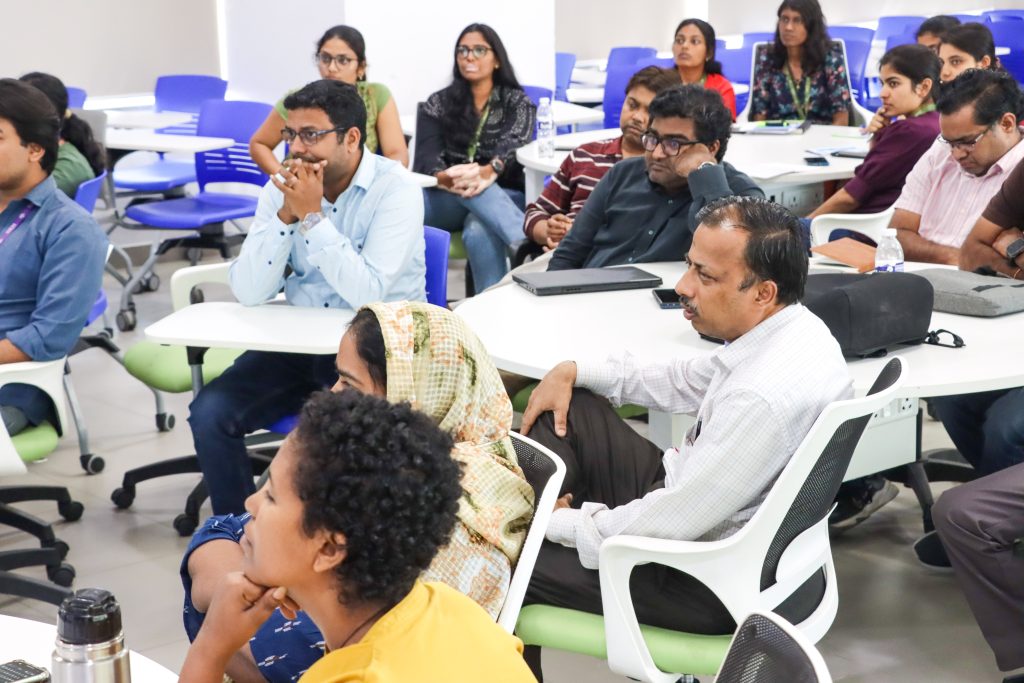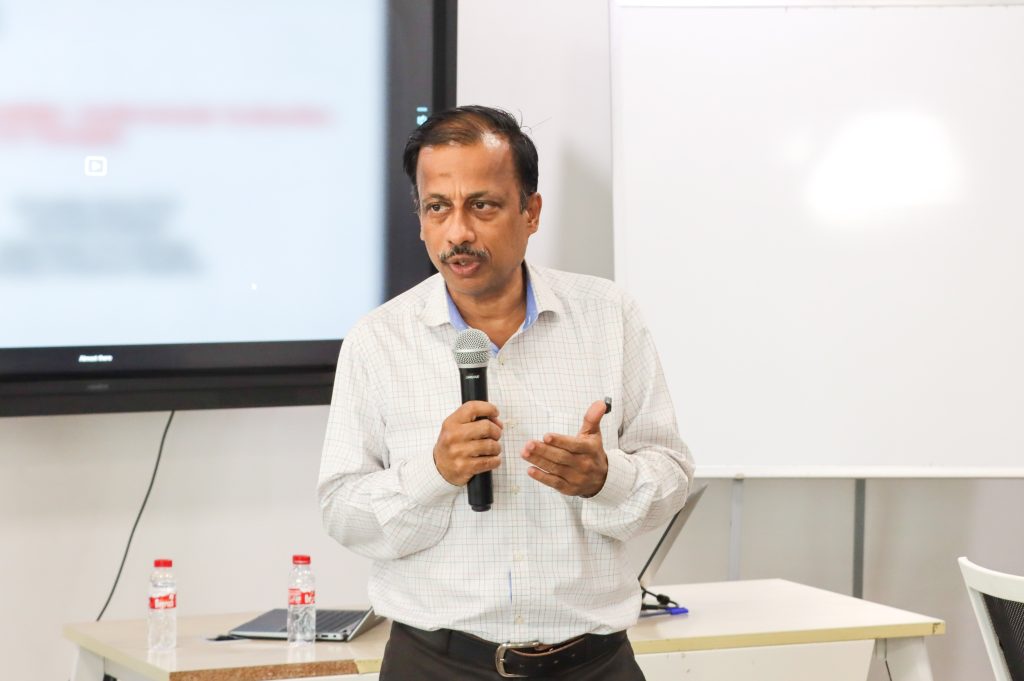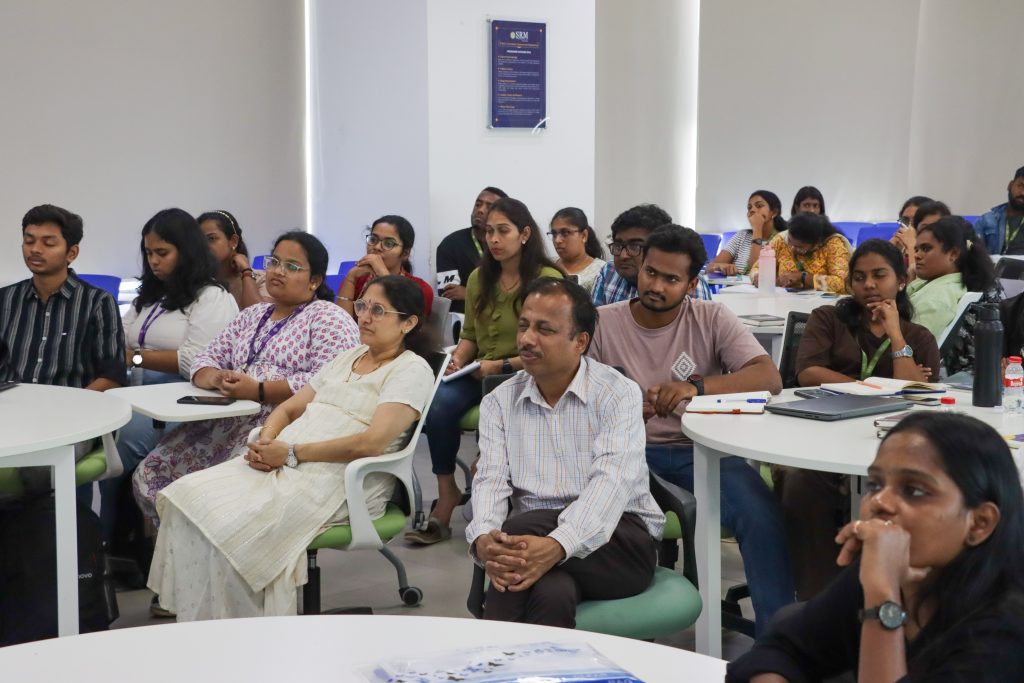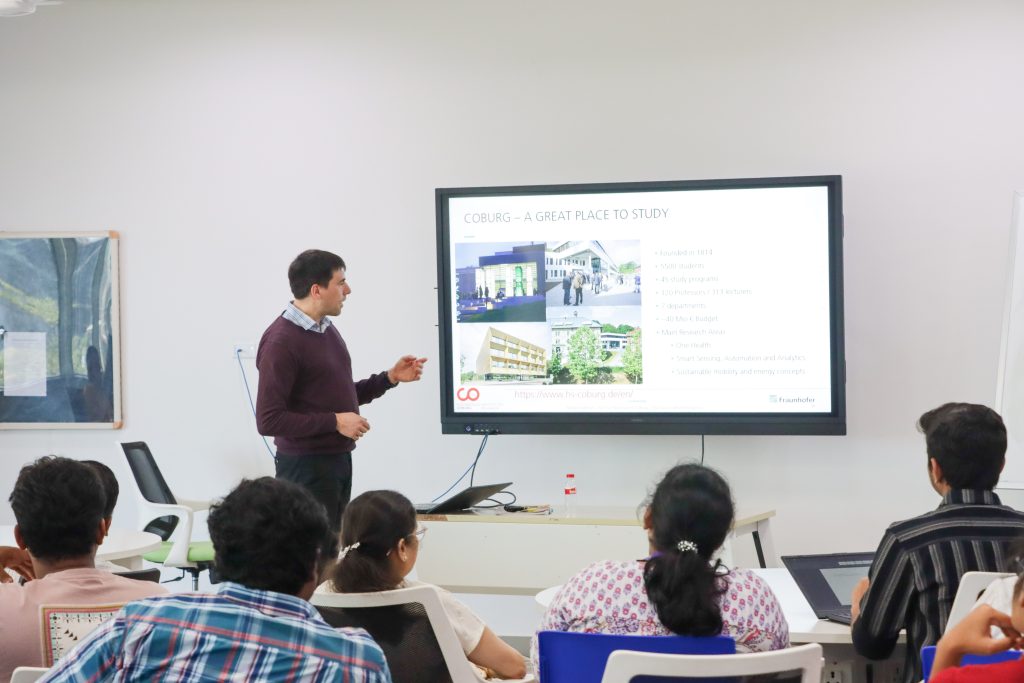Recent News
- Expert Talk on Marine-Based Bioactive Compounds August 31, 2025
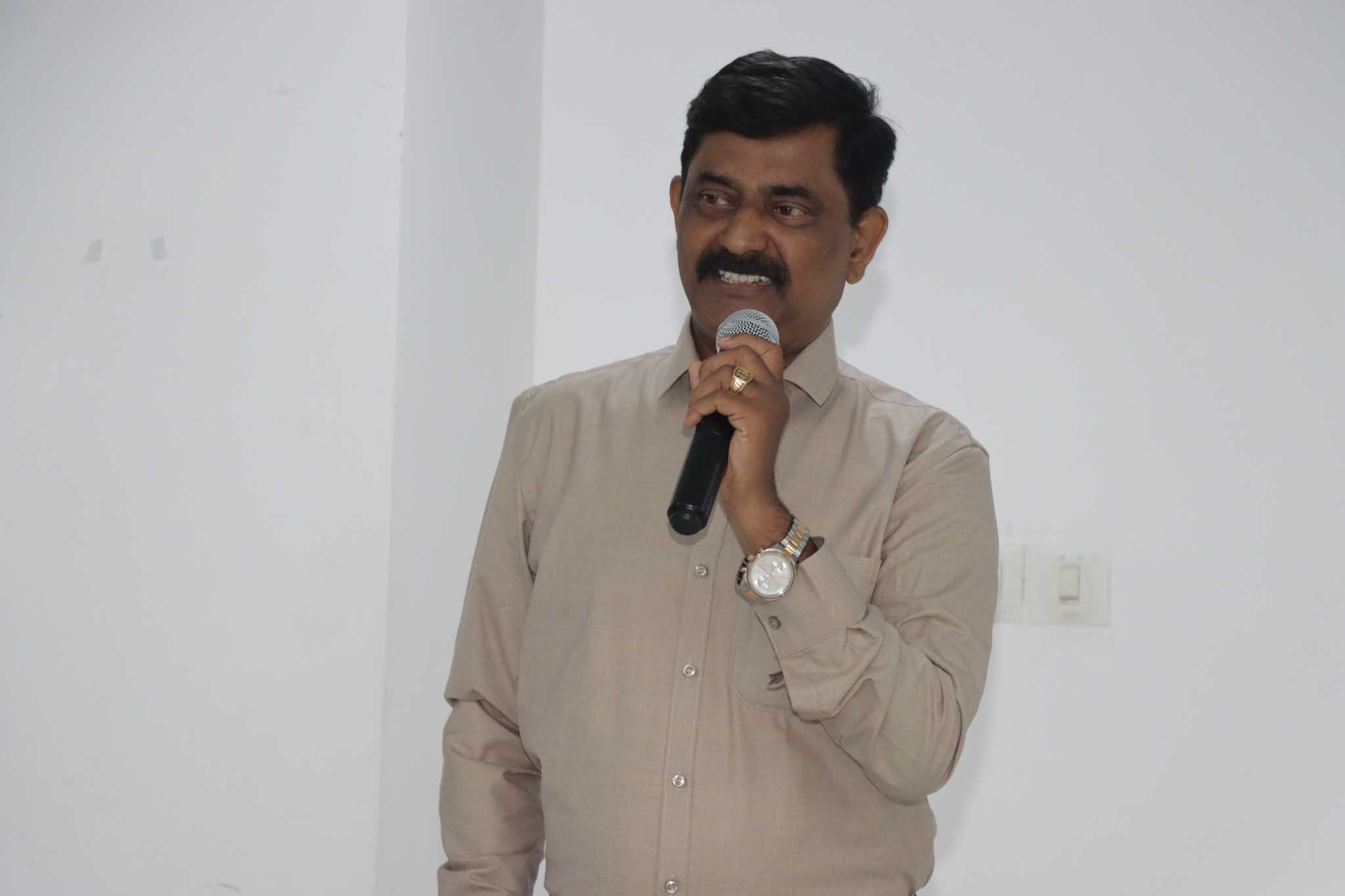
The Department of Biological Sciences, School of Engineering and Sciences (SEAS) organised an Expert Talk on the theme “Exploring Marine-Based Bioactive Compounds for Biomedical Applications”. The distinguished lecture was delivered by Prof. Dr C Arulvasu, Professor and Head, Department of Zoology, University of Madras. The session was hosted by Prof. Jayaseelan Murugaiyan.
In his address, Prof. Dr Arulvasu provided valuable insights into the biomedical potential of marine-derived bioactive compounds, underscoring their emerging significance in combating critical health challenges such as cancer, microbial infections, inflammation, and tissue damage. He explained that bioactive substances from marine organisms remain largely underexplored for therapeutic applications, yet hold immense promise for future biomedical innovations.
Drawing on his three decades of research experience, Prof. Dr Arulvasu shared highlights of his pioneering work on toxins derived from various marine organisms, showcasing their potential applications in biomedical science. He emphasised the importance of adopting a multidisciplinary approach, integrating biology, chemistry, nanotechnology, and bioinformatics, to unlock and harness the therapeutic value of marine bioresources effectively.
The interactive session fostered meaningful engagement, where participants gained a deeper understanding of how marine bioactives represent the next frontier in biomedicine.
Concluding the lecture, Prof. Dr Arulvasu invited students and researchers of the University to collaborate with him in advancing this promising field of study, emphasising the transformative role that marine bioactives can play in shaping future biomedical research and applications.
Continue reading → - Lecture on Neurodegenerative Diseases July 30, 2025
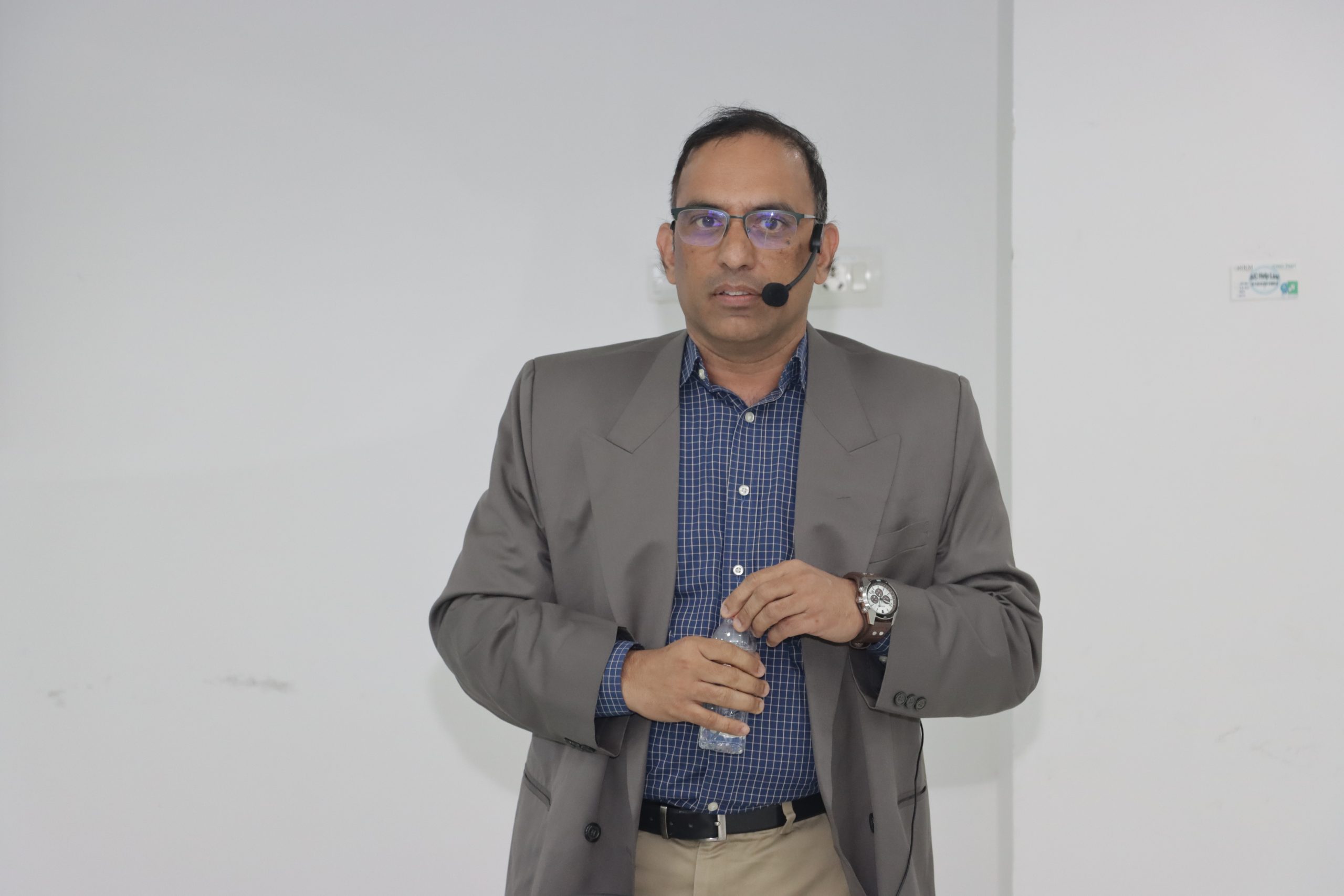 The Department of Biological Sciences at SRM University-AP hosted an impactful expert talk on Emerging Therapeutic Strategies for Neurodegenerative Diseases featuring the renowned educator and biologist, Dr Maheedhar Kodali. Dr Maheedhar Kodali from the Department of Cell Biology and Genetics at Texas A&M University and Cellular Neuroscience shared his extensive knowledge in the subject that saw a huge participation from students and researchers alike.
The Department of Biological Sciences at SRM University-AP hosted an impactful expert talk on Emerging Therapeutic Strategies for Neurodegenerative Diseases featuring the renowned educator and biologist, Dr Maheedhar Kodali. Dr Maheedhar Kodali from the Department of Cell Biology and Genetics at Texas A&M University and Cellular Neuroscience shared his extensive knowledge in the subject that saw a huge participation from students and researchers alike.During his lecture, Dr Kodali delved into the latest advancements in various interconnected fields, including neurodegeneration, cell biology, genetics, and biomedical sciences. His insights on the current research trends and challenges faced by these disciplines, offered a comprehensive understanding of how they interrelate. This was especially vital in an era where the understanding of neuro degenerative diseases is more crucial than ever.
The event was structured to encourage active participation through interactive sessions. Participants were engaged in discussions that promoted knowledge exchange, allowing attendees to ask questions and share their own insights. These collaborative exchanges not only enriched the experience for all involved but also laid the groundwork for future interdisciplinary research opportunities.
One of the primary goals of Dr Kodali’s talk was to enhance scientific awareness among the participants. By sparking academic curiosity and stimulating intellectual discourse, he supported the professional development of attendees, encouraging them to pursue their interests further and potentially spark new research initiatives.
The expert talk not only disseminated knowledge but also cultivated a community of learning and exploration, underlining the importance of collaboration in advancing scientific discovery. Dr Kodali’s presence and expertise provided an exceptional platform for engagement and inspiration, aligning with the university’s mission to promote innovative research and academic growth.
Continue reading → - Dr Anil K Suresh’s Work in Sustainable Nanoscience Lead his Scholar to Achieve Success April 9, 2025
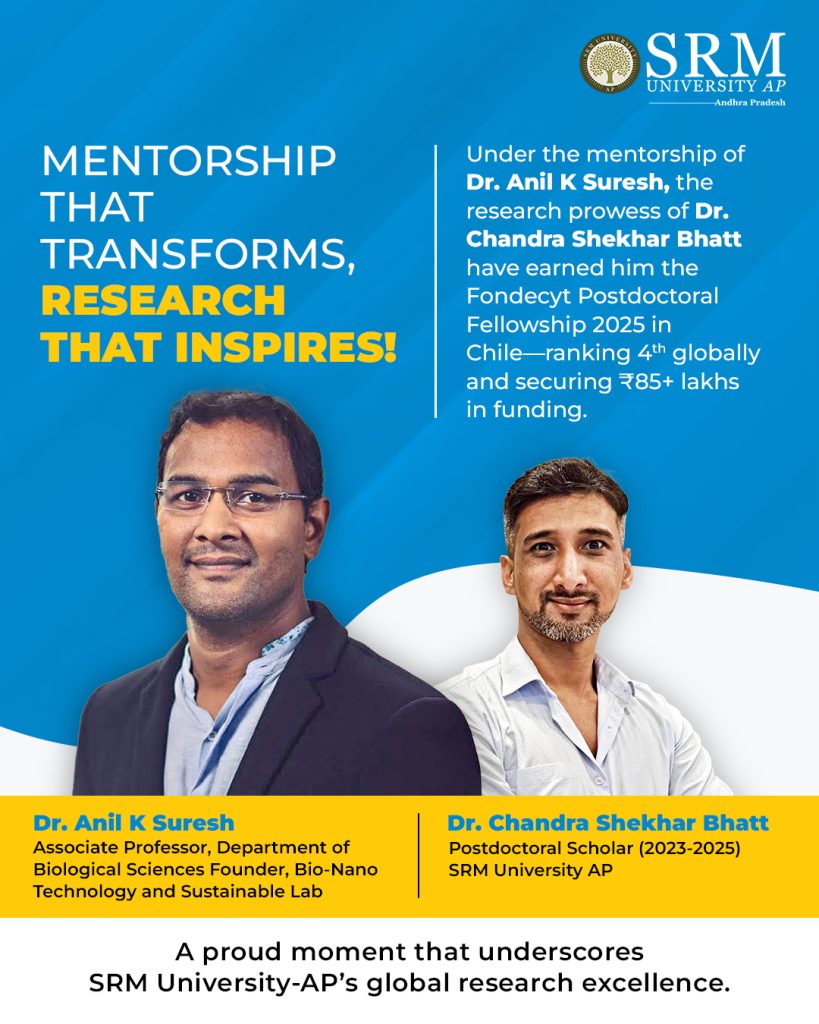
Dr Anil K Suresh, Associate Professor in the Department of Biological Sciences and Principal Investigator of the Bionanotechnology and Sustainable Lab, has achieved yet another feat with his ground-breaking work in sustainable nanoscience. His lab, committed to eco-conscious research, focuses on the sustainable synthesis of nanoparticles for applications in drug delivery, environmental remediation, and catalysis.
An outstanding accolade of his mentorship is the recent achievement of Dr Chandra Shekhar Bhatt, his former PhD student and Postdoctoral Scholar, who has secured the prestigious Fondecyt Postdoctoral Fellowship 2025 in Chile—ranking 4th globally and receiving over ₹85 lakhs in funding.
Under Dr Suresh’s guidance, their collaboration led to 12+ high-impact publications and global recognition, including features in C&EN, USA. Dr Suresh’s contributions span 64 Scopus-indexed papers, 27 book chapters, 4 books, 7 patents, and numerous fellowships and awards. Through his start-up, GreenGen Science Solutions, he champions scalable green innovations like the revolutionary “Jumbocatalyst” for hydrogenation reactions, “specfilm” for UV-spectroscopy, and “ultra-stable gold nanoparticles” transforming waste into eco-saving technologies.
Dr Anil K Suresh’s remarkable journey and the ripple effect of his visionary leadership inspire all researchers at the SRM AP community. Dr Chandra S Bhatt’s success in securing the prestigious fellowship is a testament to the high-quality research conducted at SRM AP.
Continue reading → - Expert Talk by Prof. Meenakshi Munshi March 21, 2025
The Department of Biological Sciences at SRM University-AP organised an Expert Talk on “Various Funding Opportunities for Departments, Scholars, Postdocs, and Faculty of Life Sciences”. The event featured Prof. Meenakshi Munshi, Former Adviser/Scientist-G and Head of HRD & Societal Program Division at the Department of Biotechnology, Government of India.
The session had a turnout of participants and faculty members from various departments. The event, organised under the guidance of Dr Anil K Suresh, aimed to provide comprehensive information about the diverse funding landscape available to support research and academic initiatives in the life sciences domain.
During her presentation, Prof. Munshi offered a detailed overview of numerous funding sources accessible to researchers at different career stages. She expertly navigated through the complexities of eligibility criteria and application procedures, empowering attendees with practical knowledge and to identify and pursue appropriate funding opportunities. Prof. Munshi stressed on the importance of developing well-crafted research proposals and realistic budgets that align with the priorities of funding agencies, significantly increasing the chances of securing financial support.
One of the highlights of the session was Prof. Munshi’s emphasis on the value of collaborative research networks. She explained how strategic partnerships can strengthen funding applications and expand the scope and impact of research projects. This perspective encouraged participants to think beyond individual pursuits and consider the benefits of interdisciplinary collaboration, a principle that aligns perfectly with SRM University-AP’s research philosophy.
The event fostered intellectual discussions among participants, creating an environment conducive to knowledge sharing and networking. Students and faculty alike engaged with Prof. Munshi, seeking clarification on specific aspects of the funding process and sharing their experiences and challenges.
The talk built confidence in the participants’ ability to navigate the funding landscape. Armed with practical strategies for identifying suitable funding sources, understanding application requirements, crafting compelling proposals, and building collaborative networks, attendees are now better positioned to advance their research endeavours.
Continue reading → - From Mechanisms to Theory: Dr Siva Reddy Addresses Students of Biological Sciences February 28, 2025
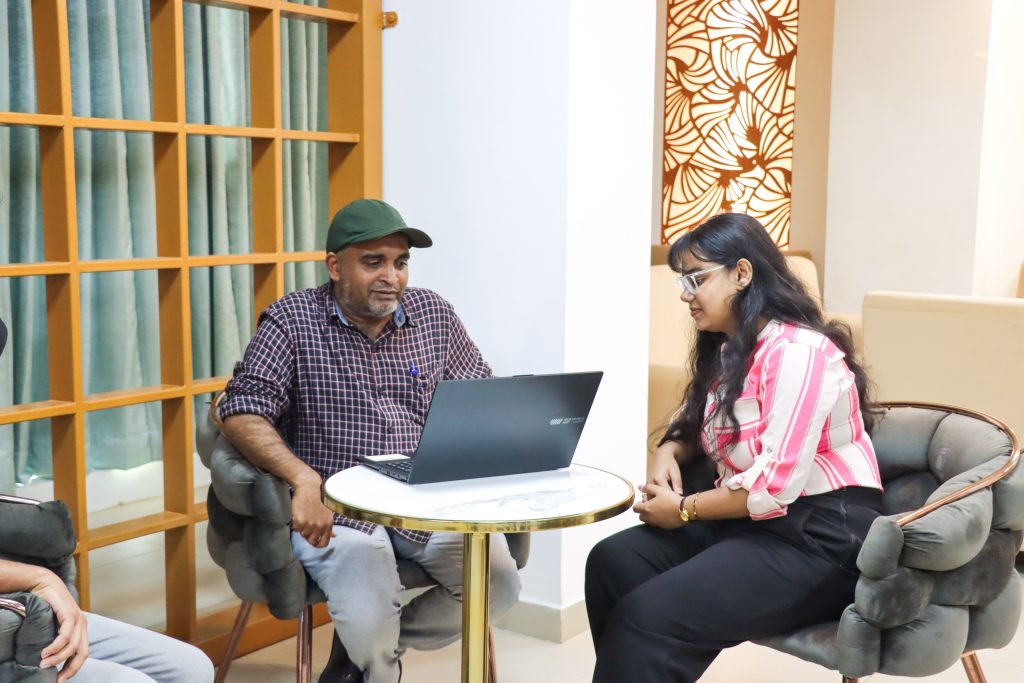 The Department of Biological Sciences organised a significant expert talk titled “Senescence-Associated Cardiovascular Dysfunction: From Mechanisms to Therapies”, the talk was led by Dr Kotla Siva Reddy, Associate Professor, Department of Cardiology, Division of Internal Medicine, The University of Texas MD Anderson Cancer Center, Houston, TX, USA. This talk aimed at research scholars in the field explored the complex interplay between cellular senescence, cardiovascular health, and the adverse effects associated with cancer and HIV treatment drugs.
The Department of Biological Sciences organised a significant expert talk titled “Senescence-Associated Cardiovascular Dysfunction: From Mechanisms to Therapies”, the talk was led by Dr Kotla Siva Reddy, Associate Professor, Department of Cardiology, Division of Internal Medicine, The University of Texas MD Anderson Cancer Center, Houston, TX, USA. This talk aimed at research scholars in the field explored the complex interplay between cellular senescence, cardiovascular health, and the adverse effects associated with cancer and HIV treatment drugs.The resource person, Dr Siva Reddy, with his extensive academic background in Biotechnology set the stage for discussions. Key topics of discussion included the molecular mechanisms underlying cardiovascular dysfunction linked to cancer and HIV therapies, particularly focusing on oxidative stress and endothelial dysfunction.
The event also fostered an interactive environment where scholars and students engaged in meaningful dialogues. Attendees gained crucial insights into how cellular senescence and foam cell formation contribute to atherosclerosis, thereby affecting cardiovascular health.
In conclusion, the event successfully facilitated rich discussions on the intersections of oncology, virology, and cardiovascular health. By focusing on innovative therapeutic strategies and the underlying mechanisms of cardiovascular diseases induced by treatment regimens, the event contributed significantly to enhancing the collective understanding and research efforts in the realm of cardiovascular aging.
Continue reading → - MoU with SHRI Opens New Pathways in Medicine February 12, 2025
In an effort towards enhancing academic and research capabilities, SRM University-AP and Samishta Hospital and Research Institute (SHRI) formalised an understanding on scientific cooperation in biological sciences and other areas of mutual interest. The MoU signing ceremony that took place at SRM University-AP and was signed by Dr R Premkumar, Registrar- SRM University-AP and Dr Kalyan Chakravarthy, Managing Director-Samistha Hospital and Research Institute, Guntur in the presence of Dr Sandeep and Dr Ravi Teja, Dr Varun, Dr Ramakrishna, Dr Gnana Prakash Doctors from SHRI and Prof. C V Tomy, Dean-School of Engineering and Sciences; Prof. Ranjit Thapa, Dean-Research; Prof. Jayaseelan Murugaiyan, Associate Dean-Sciences (Admission Outreach and Research Collaborations); Assistant Professors at the Department of Biological Sciences-Dr Sutharsan Govindarajan, Dr Anil K Suresh, Dr Prateek Gupta among others.
The MoU will open pathways for collaborative opportunities in research and academics, fostering joint research projects and funding possibilities while also emphasising the importance of skill development through seminars organised by both the institutions.
Registrar Dr R Premkumar highlighted the significance of this partnership and the potential outcomes of the joint venture. Dr Sutharsan Govindarajan thanked the team from Samistha Hospitals and Research Centre for joining hands and taking the phase therapy from bench to bedside. This MoU between the two institutes of eminence aims to create a dynamic environment for innovative research that will benefit not just our institutions but also the society in general.
Continue reading → - Prof. Stefan Kalkhof on Advancing Biomaterial Design February 10, 2025
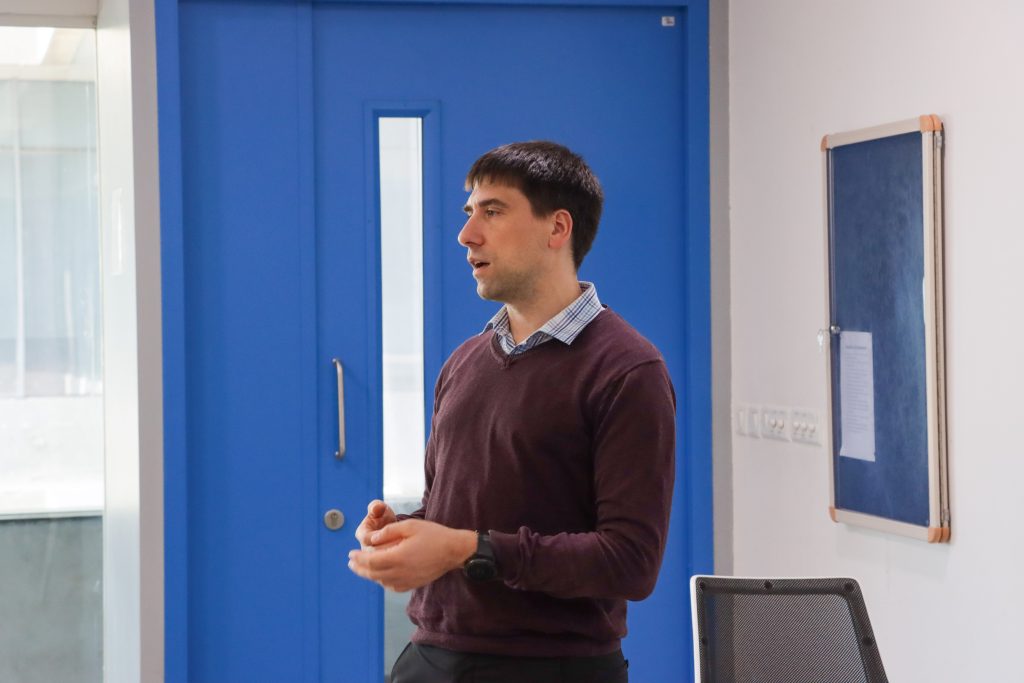
The Department of Biological Sciences organised an expert talk on “Guiding Biomaterial Design Through the Power of Omics Technologies” by Prof. Stefan Kalkhof on February 05, 2025. Prof. Kalkhof, a distinguished member of the Faculty of Applied Natural Sciences, Coburg University of Applied Sciences, Germany, and Head of the Proteomics Research Group at the Fraunhofer Institute for Cell Therapy and Immunology (IZI), Germany, began the session with an introduction to Coburg University, highlighting its rich academic history and research contributions, followed by a brief overview of the Fraunhofer Institute for Cell Therapy and Immunology (IZI), which is dedicated to developing the medicine of the future through innovative research in cell therapy and immunology.
Prof. Kalkhof’s talk focused on the potential of mass spectrometry-based proteomics and its wide-ranging applications in biomedical research. He emphasised how this advanced technology helps study the structure and function of drug targets, develop cancer-specific drugs, design functional implants, understand bacterial infections, and assess the toxic effects of chemicals.
A significant part of the discourse revolves around bone implants and tissue regeneration. He explained that although bones naturally regenerate, certain conditions, such as Type 2 diabetes and other metabolic disorders, may need bioactive scaffolds to promote healing. These smart scaffolds are designed to stimulate active tissue regeneration.
Prof. Kalkhof also spoke about the importance of proteomics technologies in regenerative medicine. He highlighted how mass spectrometry at the protein level plays a crucial role in healing, diagnostics, and drug development. His discussion extended to bioactive functional implants, a field that offers vast opportunities for materials scientists, chemists, toxicologists, and medical researchers.
The session also covered clinical trials and experimental models used to evaluate bioactive scaffolds, including in vitro and in vivo characterisation, osteoblast cell culture models, and simulation experiments in animal models.
Towards the conclusion of his talk, Prof. Kalkhof provided insights into ongoing projects in regenerative medicine, emphasising the significance of comprehensive analysis for bio-resource-based bioactive scaffolds. He also acknowledged his core research team and their invaluable contributions to these projects. The lecture was followed by an engaging Q&A session, where students and faculty members posed insightful questions about proteomics, biomaterials, and regenerative medicine.
Continue reading →


